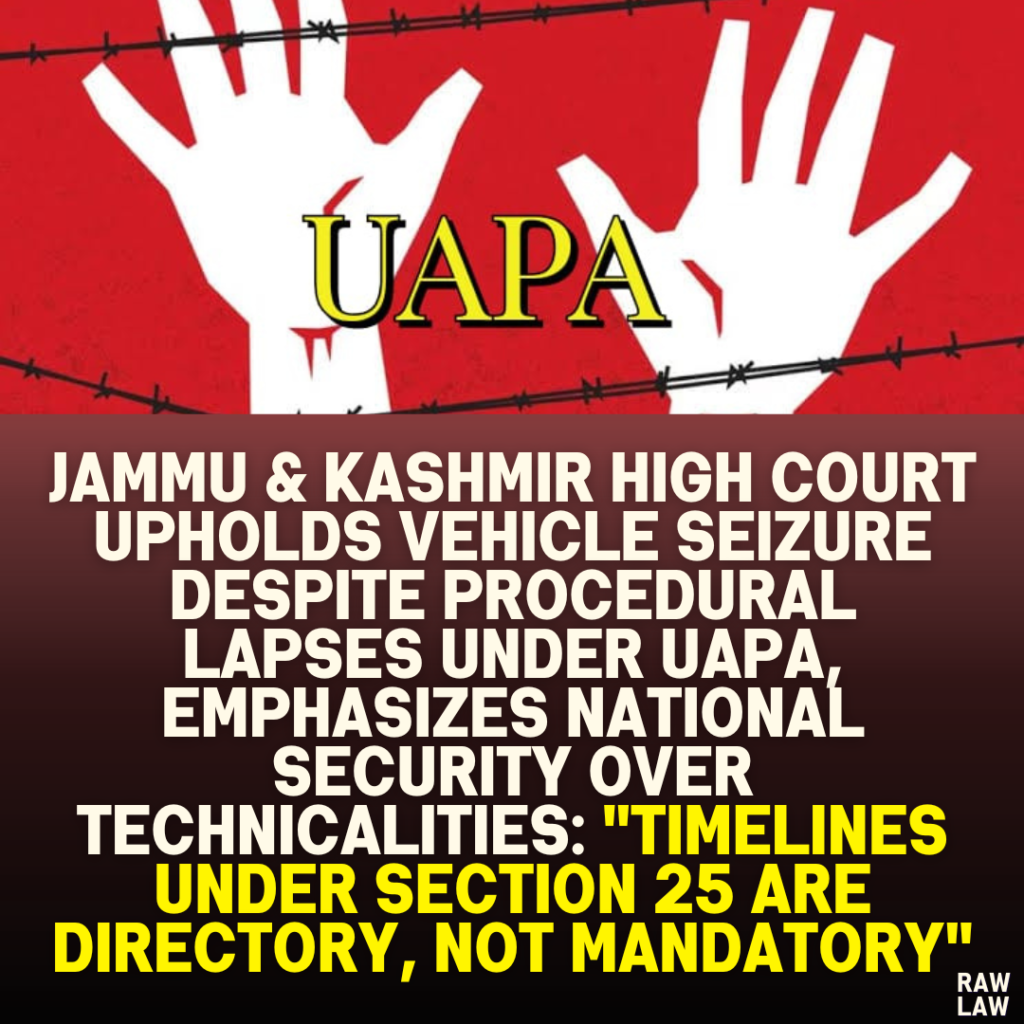1. Court’s Decision:
The Jammu & Kashmir High Court dismissed an appeal filed against the orders of the Additional Sessions Judge (NIA Court) and the Divisional Commissioner, which had confirmed the seizure of a vehicle allegedly used for illegal activities, including transporting arms, ammunition, and narcotics. The court ruled that procedural delays in compliance with Section 25 of the Unlawful Activities (Prevention) Act (UAPA), 1967, do not invalidate the seizure. It emphasized that the timelines under Section 25 are directory rather than mandatory and upheld the seizure to preserve the integrity of the trial.
2. Facts:
- The vehicle bearing registration number JK01AJ/0219 was seized during an investigation linked to an FIR (No. 57/2020) registered under Sections 13, 16, 18, and 38 of the UAPA, as well as 8/21 of the NDPS Act and 7/25 of the Arms Act.
- The seizure occurred on 26.07.2020, with allegations that the vehicle was used for transporting arms, ammunition, and narcotics to support terrorist activities.
- The Divisional Commissioner, acting as the Designated Authority, confirmed the seizure after considerable delay, and the Additional Sessions Judge (NIA Court) upheld this decision in its order dated 17.12.2022.
- The appellants contested these orders, arguing that procedural lapses had rendered the seizure illegal and sought the vehicle’s release.
3. Issues:
- Does non-compliance with the 48-hour timeline under Section 25 of the UAPA invalidate the seizure?
- Can a vehicle, which is mortgaged, still be seized as “proceeds of terrorism”?
- Should the vehicle be released due to depreciation in its value and lack of utility for the prosecution?
4. Petitioner’s Arguments:
- The Investigating Officer failed to inform the Designated Authority of the seizure within 48 hours, as required by Section 25 of the UAPA. The delay of 10 months rendered the proceedings illegal.
- The Designated Authority took more than 60 days to confirm the seizure, further violating Section 25 of the UAPA.
- Retaining the vehicle serves no purpose, especially since its value diminishes with time. The appellants argued that releasing the vehicle would prevent further financial loss.
5. Respondent’s Arguments:
- The vehicle was found to have been used for illegal and terrorist activities, including transporting arms, ammunition, and narcotics.
- Procedural delays, though regrettable, are not fatal in cases concerning national security, as the timelines under Section 25 are directory.
- Retaining the vehicle is necessary to preserve its evidentiary value for the trial. Release of the vehicle could compromise the case.
6. Analysis of the Law:
- Section 25 of UAPA: This section empowers the Investigating Officer to seize property believed to be proceeds of terrorism. It also mandates:
- Informing the Designated Authority within 48 hours of seizure.
- The Designated Authority must confirm or revoke the seizure within 60 days.
- These timelines are directory, not mandatory, to ensure the efficacy of anti-terrorism measures.
- Procedural delays do not invalidate actions taken under the stringent provisions of the UAPA, provided the delay does not result in gross injustice.
7. Precedent Analysis:
- While the judgment does not explicitly cite precedents, it aligns with legal principles that procedural lapses should not undermine substantive justice, especially under laws addressing terrorism and national security.
- The court emphasized the broader purpose of the UAPA, which is to deter and combat terrorism effectively, even at the cost of procedural flexibility.
8. Court’s Reasoning:
- Timelines Are Not Mandatory: The court held that the procedural lapses, such as the delay in notifying the Designated Authority or the authority’s delay in confirming the seizure, are not fatal to the case. The overriding objective of the UAPA is to safeguard national security.
- Vehicle’s Use for Illegal Activities: The allegations that the vehicle was used for transporting arms, ammunition, and narcotics are sufficient to justify its seizure.
- Mortgage Argument Dismissed: The appellants’ argument that the vehicle could not be seized because it was mortgaged was rejected. The court held that the use of the vehicle for illegal purposes overrides ownership or financial arrangements.
- Retention of Vehicle Justified: The vehicle’s evidentiary value in the trial and the allegations of its misuse for terrorist purposes warranted its continued retention by the authorities.
9. Conclusion:
The court dismissed the appeal, stating:
- Procedural lapses, such as delays under Section 25 of the UAPA, do not invalidate the seizure.
- The vehicle’s retention is essential to ensure justice and maintain the integrity of the trial.
- Compensation to the owner, if warranted, can be addressed at a later stage.
10. Implications:
- This judgment underscores the judiciary’s approach to prioritize national security over procedural lapses in cases involving terrorism.
- It reinforces the principle that the stringent provisions of the UAPA must be interpreted in a way that ensures their efficacy, even at the cost of procedural flexibility.
- The ruling sets a precedent for balancing procedural fairness with the broader public interest in combating terrorism.




Pingback: Bombay High Court Dismisses Plea for Interest Waiver Under Section 220(2A) of Income Tax Act, Emphasizing Compliance with Mandatory Statutory Conditions and Failure to Prove Genuine Hardship or Cooperation - Raw Law